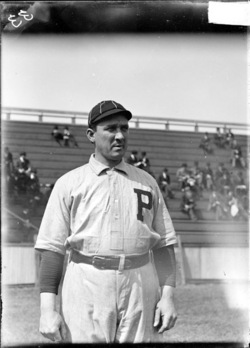Before the 1901 season
1899: Major League Baseball leaves Cleveland

The Cleveland Spiders were dissolved after winning only 20 games and losing 134 in the 1899 season along with the Louisville Colonels, Baltimore Orioles, and the Washington Senators, leaving the National League with eight teams to begin the 1900 season. As a result, 1900 marked the first year since 1886 during which the city of Cleveland did not have a team affiliated with Major League Baseball.
1900: A new franchise
Ban Johnson, president of the Western League, changed the league's name to the American League in 1900, bringing aboard a new team in Cleveland, then known as the Cleveland Lake Shores, along with new Baltimore and Washington franchises, which would be created with or without the approval of the National League. [1] During this time, Cleveland had a minor league baseball team, known as the Bluebirds or Blues due to their all-blue uniforms, which finished their season with a 63–73 record and finished sixth. [1]
1901: Major league once more
The American League became a major league before the 1901 season. As the American League made the jump to major league status, many players jumped ship, including Cy Young and Nap Lajoie, which led the National League to call them an "outlaw league" in November 1900. [1] As the 1901 season came underway in April, and as the war between the two leagues erupted, the Cleveland franchise, now known as the Blues, began its first official season as a Major League Baseball team.

